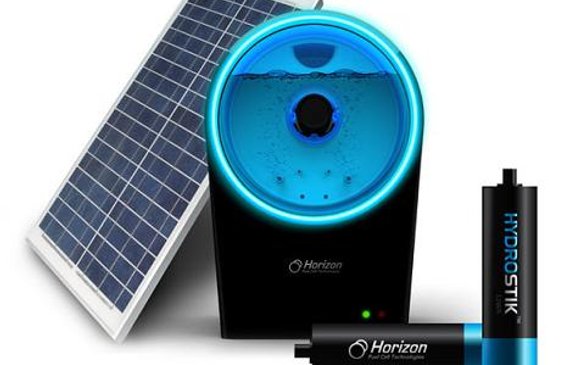
Home made hydrogen power

A perfect complement to
yesterday's solar
powered automatic chicken coop opener would be this portable hyrdogen
generator.
Kristie
Lu Stout has an interesting post about this exciting new product
that will allow everybody to generate their own hydrogen from water and
store it in a safe, low pressure battery-like container. No word yet on
how much it might cost, but plans are to have a tabletop model
available by the end of 2010.
Getting off the grid with
solar or wind has always come back to battery storage. If this
technology improves, it could replace most of those expensive and toxic
chemical batteries and bring alternative energy within the reach of the
common homesteader.
Want more in-depth information? Browse through our books.
Or explore more posts by date or by subject.
About us: Anna Hess and Mark Hamilton spent over a decade living self-sufficiently in the mountains of Virginia before moving north to start over from scratch in the foothills of Ohio. They've experimented with permaculture, no-till gardening, trailersteading, home-based microbusinesses and much more, writing about their adventures in both blogs and books.
Want to be notified when new comments are posted on this page? Click on the RSS button after you add a comment to subscribe to the comment feed, or simply check the box beside "email replies to me" while writing your comment.

While hydrogen is a clean energy carrier, it does have its problems.
So to get a reasonable amount of energy stored, you need to put it under really high pressure, or cryogenically cool a high volume of the stuff. Both are hard/dangerous. A hydrogen fire is extremely hot but does not give off much visible light. It also takes very little energy to ignite a hydrogen/air mixture, about 1/10th of the energy that it takes to ignite a gasoline/air mixture.
So as energy storage, alcohols like ethanol are much safer, because they are liquid are room temperature and pressure.
Hmm, it looks like they're storing the hydrogen by bonding it to a metal, in the form of a metal hydride. According to the manufacturers documentation, the energy density of these storage capsule is about the same as that of a good Li-ion battery (160 Wh/kg). Given that you'd have to feed the hydrogen to e.g. a PEM fuel cell with an efficiency of 40-60%, practical energy density is about half of that of a battery.
If you look at the manufacturers website, these canisters are for an open toy RC car. Now, for metal hydrides to give off hydrogen, you have to heat them. Usually this is done with waste heat from the fuel-cell. Given that hydrogen leaks easily, and there is a hot fuel cell generating electricity nearby, I'd be cautious about putting a scaled-up version of such a device in an enclosed space. You'd have all the ingredients for "goes boom" in one convenient package.
There are already fuel cells commercially available that can directly use e.g. methanol. If a carbon-neutral and efficient way could be found to generate methanol (or syngas, because that is easily converted into methanol), that sounds like a safer option. See the methanol economy article. Methanol is harder to ignite than gasoline, easy to store, and has an energy density an order of magnitude greater than highly compressen hydrogen and 15 times higher than a Li-ion bettery.
Well, pretty much every kind of rechargable battery available today uses toxic and/or highly reactive components. At least lead/acid batteries can be and are recycled pretty effectively.
Maybe ultracapacitors will one day be able to replace batteries, not not for a while. With the current trend towards electric cars, there is a lot of work being done on storing electric energy. Something useful will pop up sooner or later.